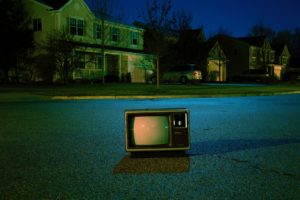
I recently read an article from The Minimalists titled “Prepared to Walk Away.” The Minimalists is a blog about simplifying all aspects of our lives by reducing our physical, mental and technological clutter. For most who embrace this way of living, the first challenge is to declutter. The flip side of decluttering is mindful acquisition, and that’s the part of the essay that really caught my attention.
Some people think of minimalism as something practiced by wealthy elites who live in large, white, coldly antiseptic, ultra-modern spaces. It’s trendy right now to declutter and organize, an interesting push back against the relentless consumerism of the twentieth century. I hate clutter and love to be organized, but that isn’t what most attracts me to the practice of minimalism.
What I have my eye on are the intangibles in life, the stories, beliefs and habits accompanying us through our days. How and why do we acquire such things? How much of the acquisition is conscious rather than unconscious, and how heavily are we influenced by the people around us and their stories, beliefs and habits?
Minimalism, when I discovered the movement in the last months, seems to synthesize many of the ideas and thoughts I’ve discussed on this blog, including letting go, quitting, boundaries, the failure of money, being right, outcomes and rewriting our stories.

It seems to me the vast majority of our mental clutter is carelessly acquired or thrust upon us as an obligation. We humans are powerful in our ability to absorb influence, and we’re fatally prone to addiction. Our consumer culture has exploited these weaknesses mercilessly, from alcohol, sugar and cigarettes to video games, social media and the Internet. The media grooms us from childhood to be mindless recipients of stimulation to buy, to believe and to comply.
Critical thinking is unfashionable, to say the least. I look around me and see shriveled attention spans. Fewer and fewer people seem to respect or even recognize peer-reviewed, verifiable, fact-based science from the idiotic and ignorant ravings of malcontents, manipulators and madmen who peddle hatred, bigotry and misinformation to the masses from television, radio, the internet and social media.
Thus, we’re positioned, mouths agape, eyes reflecting the sparkle and shine of baubles and distractions, minds numb, stumbling through life with one eye on some kind of a screen at all times, while words and assertions assault us from every direction from thousands of gaping mouths and talking heads and millions of busy fingers.

Mindfulness? You’re kidding. Who has the time, quiet and space to even think about what mindfulness means, let alone practice it? How many people feel that the only way they can face their life is to avoid mindfulness at all costs?
Decluttering a closet is one thing. Can we sort through our ideas and habits and discard what’s unattractive, outgrown, outdated or worn out? It’s agonizing to consider a piece of clothing, especially a costly one that seemed like such an exciting deal when we got it, and realize we don’t wear it, don’t like it or it doesn’t go with anything else we wear. We’ve invested money in that item. It’s in good shape and of good quality. We can’t just discard it. What a waste! We’ll never get our investment back out of it.

Ideas, habits and beliefs are even harder to walk away from. We might not have spent money in acquiring them, but they tie us to our tribe, our workplace, our church, our family and our community. They influence our favorite social media platforms, our news and radio purveyors and our identities. Our addictions cement us into communities of other addicts, or at least into communities which enable our addictions.
We know everything about holding on: holding on to power; holding on to identity; holding on to our beliefs; holding on to stuff, either because we want to or someone else expects us to; holding on to grievance, outrage and fear. What we don’t seem to understand is how holding on locks us into place. We can’t grow. We refuse to learn. Fear has killed our natural curiosity and drive to explore.
On the other hand, a willingness to discard any object or intangible in our lives, if necessary, means we consent to grow, change, learn and be flexible and resilient.
Mindful acquisition is a conscious activity, an agreement we make with ourselves to buy that new item or explore a new idea or relationship, fully prepared to walk away if the item, idea or relationship become, at any time, a detriment rather than an asset.
It’s easy to think about objects in terms of money. Beliefs and habits are less concrete, yet our habits cost us far, far more than what we lose when we discard an expensive coat we just don’t wear. Talk to anyone who has tried to be in relationship with a workaholic or a substance, screen or gamer addict about the cost of our behavior. Money is, after all, only a symbol of value we agree to use. Our intangible clutter costs us relationships, connection, our health and sometimes our lives.
At first look, it seems being willing to walk away from relationships weakens our ability to connect. In fact, I think in the long run it strengthens healthy bonds. If I know both I and the other party are prepared to walk away, I’m responsible for making a choice, over and over again, to stay, nurture and invest in a healthy connection — for both of us.

Practicing mindful acquisition requires me to pay close attention to the thoughts, beliefs, ideas and habits I give time and energy to or consider adopting. Do they increase my power and joy or diminish it? How does my mental and emotional clutter interact with my relationships and ability to communicate and contribute? How do these intangibles affect my heath and energy?
The irritating thing about personal power management is that it takes work and mindfulness. We can’t stay asleep at the wheel. Sure, reclaiming our stolen, lost or dormant power is a rush, but then we have to be responsible for our needs, priorities and choices, choices about what enters our lives and choices about what we discard or walk away from.
Our lives are limited. At 55, I’m beginning to feel the edges. I want to minimize my clutter, from items to intangibles. I want to let light and space into my home and serenity and clarity into my head and heart. I want to feel the flow of energy in the form of money, love and creativity without distraction.
I want to know I can walk away.
© 2019 – 2022, Jenny Rose. All rights reserved.